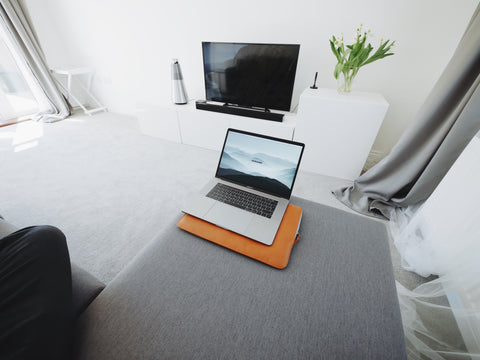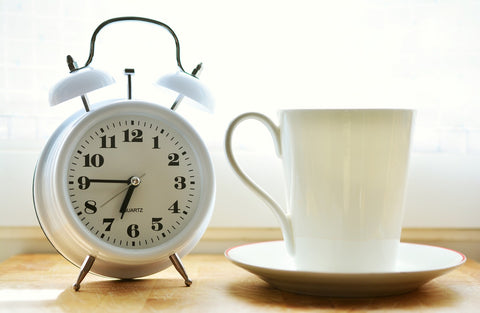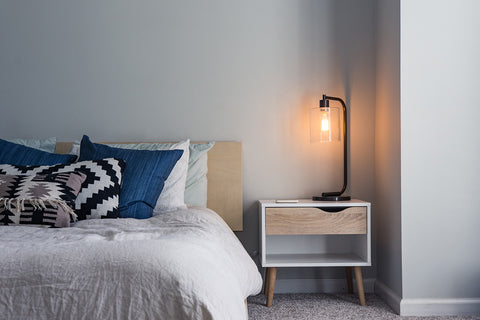Getting good sleep can be hard. Schedule changes, jet lag, overactive nerves, or aging are just a few of the things that can make getting good sleep difficult. And yet, sleep is SO important for our health and wellness. How can you get the sleep your body needs? Here are a few tips and tricks and one special offer you won't want to miss at the end!
1. Get More Light During the Day
Your body tracks night and day through your circadian rhythm. A good healthy circadian rhythm provides energy during the day and better sleep quality and duration at night. To improve your circadian rhythm make sure you are getting plenty of bright light during the day. Spend some time outdoors when there is sun or invest in a sun lamp for indoor use.
One study found that older adults with sleep disturbances that were exposed to two hours of bright light daily got 80% better sleep and increased their amount of sleep by 2 hours.

2. Avoid Eating Later in the Evening
Eating large meals late at night definitely affects the quality of your sleep. Late-night eating can result in indigestion and an even higher risk of a stroke. It also increases mental exhaustion and many people report an increase in nightmares after eating at night.
Sleep Advisor.org says experts recommend that if you are hungry, healthy snacks that are easily digested, such as fruit, should be fine in the evening but do avoid large meals at least 2 to 3 hours before bed.
3. Reduce Screen Time Before Bed
Sleep.org points out that even though cell phones, tablets, computers, and television have become a huge part of our daily lives, they are best left behind when it comes to a bedtime routine. The blue light that is emitted by the screens on these electronic devices limits the production of melatonin, the hormone that controls our circadian rhythm. On top of that, using electronics keeps the mind engaged and awake when it needs to be relaxing and preparing for rest.
It is recommended that screens be turned off at least 30 minutes before going to bed and for good quality sleep, keep electronics completely out of the bedroom.

4. Take a Natural Sleep Supplement
Web MD suggests that those with troubled sleep may find relief using herbal teas, tinctures, or other supplements. They list several tried and true sleep aids including melatonin, lavender, and chamomile.
One of the most popular sleep aid supplements is melatonin. Multiple studies, researching the use of melatonin before bed, reported improved sleep quality, shorter falling asleep time and better daily energy in those taking the supplement.
ENP’s Restorative Slumber liquid supplement is a scientifically formulated blend to help you fall asleep easily and stay soundly asleep throughout the night. It is fortified with melatonin, jujibe and inositol, comes in a delicious chocolate-mint flavor, and can be kept right by the bed.
5. DO Exercise But NOT Right Before Bed
Exercise is a great way to boost energy levels during the day and also provides deeper, more restful sleep. Exercise can also reduce stress and other negative health conditions that affect the quality of sleep.
Experts suggest avoiding vigorous exercise within three hours of bedtime. It gets the blood pumping, increases alertness, and raises the body temperature. Stretching or meditation are better forms of exercise that can be engaged in close to bedtime.

6. Reduce Caffeine Intake
Caffeine is a stimulant that 85% of Americans use daily and comes with pros and cons. While many find caffeine provides energy and alertness, it has been shown to reduce the quantity and quality of sleep. Sleep Education.org suggests using caffeine in moderation and avoiding caffeine in the late afternoon and evening to get better sleep.
7. Try to Form a Consistent Sleep Schedule
Try to wake up at the same time every day - even on the weekends. Irregular sleep patterns affect the levels of melatonin, the hormone that signals the brain when it is time to sleep. Developing a regular sleep schedule helps set your body’s circadian rhythm and provides better quality sleep.
Brandon Peters, MD at Very Well Health.com reports benefits of a fixed wake-up time to include:
- Waking up and falling asleep easier
- Improved alertness, focus, and short-term memory
- Better mood/less irritability
- Decreased pain
- Better immune system function
- Less sleep deprivation
- Better job performance
As part of setting a consistent wake-up time Peters suggests “anchoring the circadian rhythm with morning sunlight”. To do this, expose your body to 15 to 30 minutes of sunlight right after waking up. This can be done with natural sunlight or a lightbox.

8. Avoid Alcohol Before Bed
Alcohol is another substance that alters natural melatonin production and can make falling asleep difficult. It has also been shown to cause disrupted sleep patterns, snoring, and increased sleep apnea. Avoid alcohol as bedtime is approaching.
9. Create a Relaxing Sleep Environment
Improve your sleep quality by changing your surroundings. Take a good look around your bedroom for ways to set up a more peaceful sleeping place. This includes minimizing noise and light while controlling the temperature.
Many people find removing their phones, televisions, or electronic devices from the bedroom to assist in creating the quiet calm atmosphere they are seeking. Others recommend room darkening curtains or listening to calm music or nature sounds.
The National Sleep Foundation suggests:
- Dim the lights an hour before bed
- Choose colors and decorations that you love
- Keep the room clean and uncluttered
- Sleep in a cool room (60 to 67 degrees)
- Choose mattresses, pillows, and sheets that are comfortable to you
- Reduce intermittent noises and create a soothing noise backdrop using a fan
- Use soothing scents you like

10. Create a Bedtime Routine
Doing the same thing each evening before bed sends signals to the body that it is time to sleep. A warm bath, dimming the lights, or listening to calming music can be very effective.
Find what works for you. Some people find reading to be relaxing and the perfect activity to wind down before bed while others think reading makes them alert and prefer puzzles like sudoku. Avoid electronics, but do try meditation, deep breathing, or relaxation exercises.
Many people who struggle to fall asleep at night, cite the reasons as being a busy mind, worry, stress, or anxiety. It can be effective, as part of the bedtime routine, to write down worries or reminders for the next day, clearing the mind and preparing for sleep.
Conclusion
Do you find quality sleep hard to come by? There are many things that can be done to increase the chances of falling asleep easily and getting that good sleep our bodies need. Give a few of them a try today and hopefully, you will soon be enjoying a restful night's sleep!
Special offer! Buy Restorative Slumber and get Mood Boost Free! Add both to cart and Mood Boost (a $17.95 value) is yours free!
Sources
Berkley, C. (n.d.). What You Eat Can Sabotage Your Sleep. Retrieved from https://www.webmd.com/sleep-disorders/features/food-sabotage-sleep#1.
Fetveit, A., Skjerve, A., & Bjorvatn, B. (2003, June). Bright light treatment improves sleep in institutionalised elderly--an open trial. Retrieved from https://www.ncbi.nlm.nih.gov/pubmed/12789673.
How to Design a Nighttime Routine. (n.d.). Retrieved from https://www.sleep.org/articles/design-perfect-bedtime-routine/.
How Technology Impacts Sleep Quality. (n.d.). Retrieved January 13, 2020, from https://www.sleep.org/articles/ways-technology-affects-sleep/.Mawer, R. (2018, November 2). 17 Proven Tips to Sleep Better at Night. Retrieved from https://www.healthline.com/nutrition/17-tips-to-sleep-better#section1.
Lemoine, P., Nir, T., Laudon, M., & Zisapel, N. (2007, December). Prolonged-release melatonin improves sleep quality and morning alertness in insomnia patients aged 55 years and older and has no withdrawal effects. Retrieved from https://www.ncbi.nlm.nih.gov/pubmed/18036082.
Luthringer, R., Muzet, M., Zisapel, N., & Staner, L. (2009, September). The effect of prolonged-release melatonin on sleep measures and psychomotor performance in elderly patients with insomnia. Retrieved from https://www.ncbi.nlm.nih.gov/pubmed/19584739.
Natural Sleep Aids & Supplements. (n.d.). Retrieved January 13, 2020, from https://www.webmd.com/sleep-disorders/ss/slideshow-natural-sleep-remedies.
October, K., Brandi, Piwniczka, T., Corey, Anne, Engelmeyer, C., … Ethan Green. (n.d.). A Bedtime Routine For Adults: 10 Relaxing Activities For Sleep. Retrieved from https://www.nosleeplessnights.com/sleep-hygiene/bedtime-routine-for-adults/.
Six Tips to Design the Ideal Bedroom for Sleep. (n.d.). Retrieved January 13, 2020, from https://www.sleepfoundation.org/articles/six-tips-design-ideal-bedroom-sleep.
Sleep AdvisorLast Updated On January 2. (2020, January 2). Should You Eat Just Before Bed? - All The Risks Explained. Retrieved from https://www.sleepadvisor.org/eat-just-before-bed-risks/.
